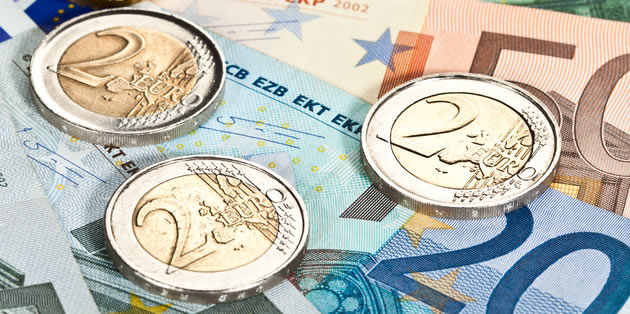EUR/GBP Exchange Rate Down as Brexit Tensions Pause
The Euro Pound Sterling (EUR/GBP) exchange rate is down today, and is currently trading at £0.8898, as Sterling benefits from Brexit developments easing ‘no-deal’ tensions.
EUR investors still remain cautious as they wait for Italian President Giuseppe Conte to revise his budget, with mounting concerns that it will again be rejected by the European Commission.
The Euro (EUR), however, recovered somewhat yesterday after the release of the Eurozone’s services PMI for November, which showed a better-than-expected increase.
This came on the back of Eurostat’s Eurozone retail figures for October which also showed an increase.
GBP, meanwhile, has had pressures eased after the recent announcement from the European Court of Justice (ECJ) that Article 50 could be unilaterally revoked – offering an alternative to a ‘chaotic’ Brexit.
The Pound (GBP) suffered from yesterday’s release of new car sales, which showed a decrease of ‑3%, dampening market confidence in the UK economy.
EUR/GBP Exchange Rate Dips as Italy’s Budget Concerns Linger
The Euro (EUR) remains volatile as concerns over Italy’s budget still linger, with the European Economics Commissioner, Pierre Moscovici, saying this morning that Italy is ‘on the right path but we need to keep making progress.’
EUR was also dented by this morning’s release of Germany’s year-on-year factory order figures for October, which were -2.7% down against September’s -2.6%.
Brexit still weighs heavily on EUR, although today’s news that the ECJ will announce next week its judgement on Britain’s ability to unilaterally reverse Article 50 – and effectively remain in the EU – has bolstered investor confidence in the single currency.
Tomorrow will see the release of Germany’s industrial production figures for October, which are likely to give EUR a leg-up if the figures mirror the expected increase.
Pound Sterling Euro (GBP/EUR) Exchange Rate Rises despite Legal Advice Exposing Brexit’s ‘Central Weaknesses’
The Pound (GBP) remains sensitive to Brexit developments today, as Prime Minister Theresa May rallies to push ahead with securing votes for her Brexit withdrawal agreement.
May has however come under increasing pressure from several angles, most notably with yesterday’s publication of legal advice on Brexit, with shadow Brexit Secretary, Sir Keir Starmer, saying that the advice exposed ‘the central weaknesses in the government’s deal.’
Tomorrow will see the release of Halifax house prices for November, which are expected to show a decrease on last year’s figures.
Also tomorrow will see the release of consumer inflation expectations data, with GBP investors taking note of any sign of a decrease.
EUR/GBP Outlook: Brexit Remains in Focus as ECJ to Announce Ruling on Article 50
The Euro Pound Sterling (EUR/GBP) exchange rate is set to be driven by political powers in the coming week, as Italy’s revised budget is expected to manifest with hopes that it will be in accordance with the EC’s rules.
Giancarlo Giorgetti, Secretary of the Council of Minister of Italy, commented:
‘The (EU) infringement procedure is not good for the country. Both Italy and Europe must do everything to avoid it.’
Monday next week will see the ECJ’s ruling on Article 50, which will remain the focus for both GBP and EUR investors.
Also on the same day will see the release of UK GDP figures for October, which may provide a boost for GBP if the British economy shows any signs of resilient growth.
Tuesday will see Parliament vote on Theresa May’s Brexit withdrawal agreement, which will potentially rock Sterling should MPs reject the deal.
EUR could find further strength against GBP on Tuesday, with the release of the ZEW Survey on economic sentiment for December, with any signs of investor sentiment increasing bolstering the single currency.



